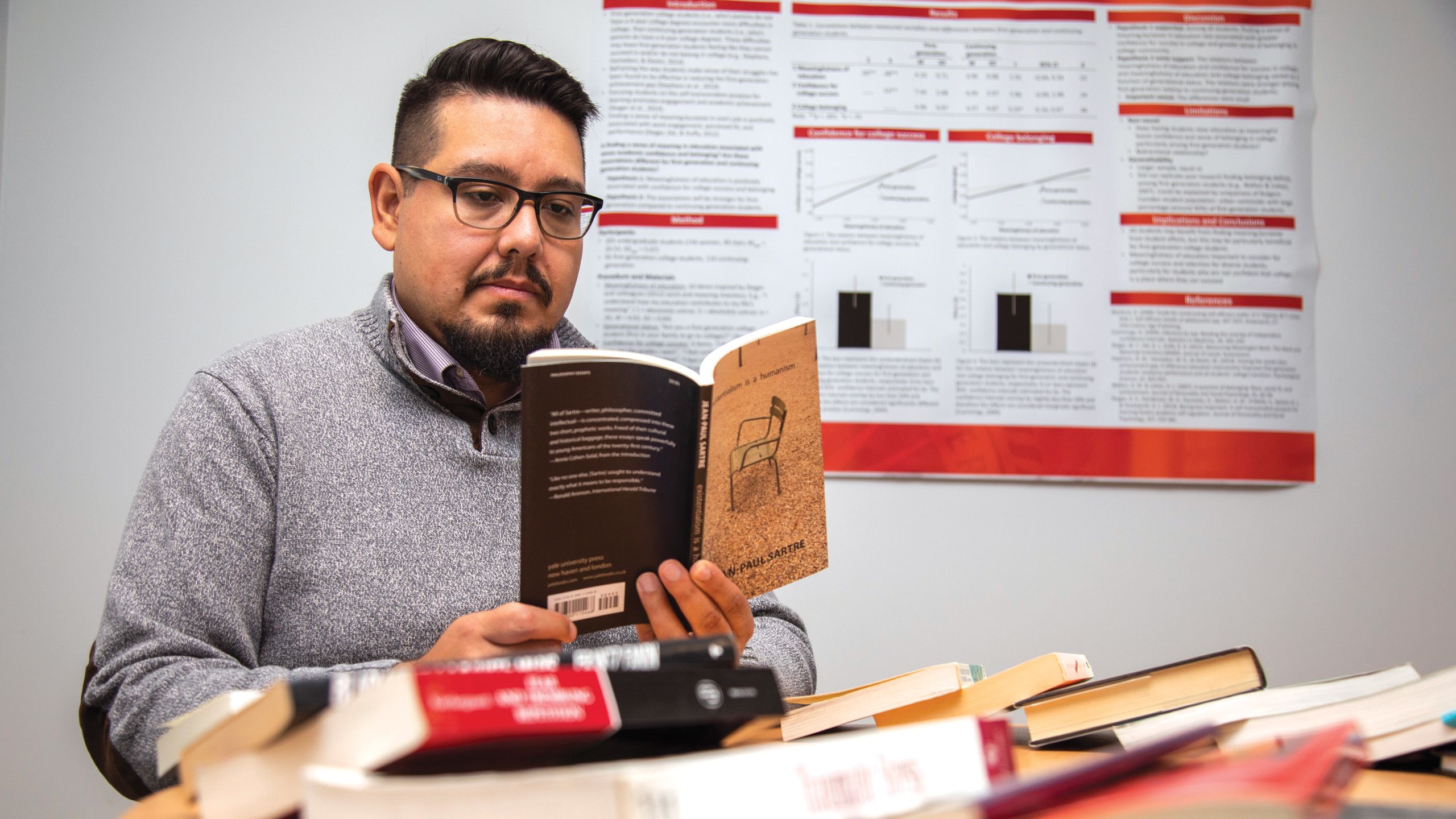Diversity of the Mind:
Psychologist’s Research Explores How Underrepresented Students Find Community and Purpose

Reflecting on a childhood spent among the Hispanic and white populations of the Southwestern United States, Rutgers University–Camden Assistant Professor of Psychology Andrew Abeyta, Ph.D. recalled feeling “in between”—not fluent enough in Spanish to fit in with recent Mexican immigrants, nor part of the narrow definition of “American” held by his white peers. Abeyta lived his formative years feeling like an outsider in his own community, which later provided the focus of the psychological research he conducts in the Camden College of Arts and Sciences: the innate need to find meaning and social belonging in life.
“The search for meaning and social belonging is fundamental to psychological health and well-being,” Abeyta said.

Andrew Abeyta, Ph.D., assistant professor of psychology
Andrew Abeyta, Ph.D., assistant professor of psychology
“Since coming to Rutgers–Camden, I have been able to shift my research from a basic scientific approach to an applied approach that looks at how meaning and belonging impact the success of first-generation college students and other underrepresented student groups.”
As a teen, Abeyta realized he derived a deep sense of meaning from the experience of learning, and the literary works of Chicano authors like Rudolfo Anaya, Gloria Anzaldúa, and Sandra Cisneros introduced him to a community of Hispanic intellectuals in which he felt he could belong. Students who find similar sources of inspiration and community, Abeyta said, are more likely to thrive in a university setting.
“Students who feel they belong socially and feel like learning gives their lives purpose are more likely to persist in college,” Abeyta said. “Identifying psychological strategies to promote belonging and meaning is particularly important for underrepresented college students, who are already at greater risk of dropping out.”
Abeyta’s minority status in his field—only 17% of U.S. psychologists are people of color—has motivated him to study the effect diversity has on the topics that are studied, written about, and debated across the discipline of psychology. He noted that many psychological studies draw broad conclusions about society even when they fail to adequately represent underserved demographics of the U.S. population.
“I think psychology is very attractive to minority students because they see it as an opportunity to lift up their communities, combat discrimination, and learn about themselves."
“Diversity is important in psychology because culture has a profound impact on human cognition and behavior,” Abeyta said. “Culture affects how we think, act, make sense of situations, and maintain our mental health. On the research side, much of what we know about human psychology is based on studies conducted in Western, educated, industrialized, rich, and democratic societies, so we need to branch out for a more complete understanding. Even in the United States, much of the research conducted is primarily on white and middle-class college students. As a field, we need to involve cultures and communities that are often overlooked.”
Beyond his research, Abeyta teaches a class on cultural psychology, in which he aims to increase students’ competence in interacting with diverse individuals both in clinical settings and in everyday life.
“Openness and understanding of cultural difference are very important when interacting with people from different backgrounds. Understanding how to navigate those interactions can lead to better intergroup relations and promote health and well-being for all.”
Although Abeyta has found many sources of meaning and belonging throughout his life and career, Rutgers–Camden stands out among them. His time as a Rutgers–Camden psychologist, he says, has allowed him to realize a dream of mentoring other minority students and first-generation scholars, just as he received guidance from mentors who could relate to his experiences.
“The biggest thing that we do as a psychology department at Rutgers–Camden is get students involved in research,” Abeyta said. “I think psychology is very attractive to minority students because they see it as an opportunity to lift up their communities, combat discrimination, and learn about themselves.”
"I want to be one of these figures who can inspire and support minority and first-generation college students. Rutgers–Camden is a great place to serve that purpose."

Chancellor Antonio D. Tillis and Rutgers University–Camden invite you to celebrate National Hispanic Heritage Month by recognizing and honoring Hispanic individuals who have made a difference in the Rutgers–Camden community and beyond.

Creative Design: Karaamat Abdullah
Photographer: Ron Downes, Jr.